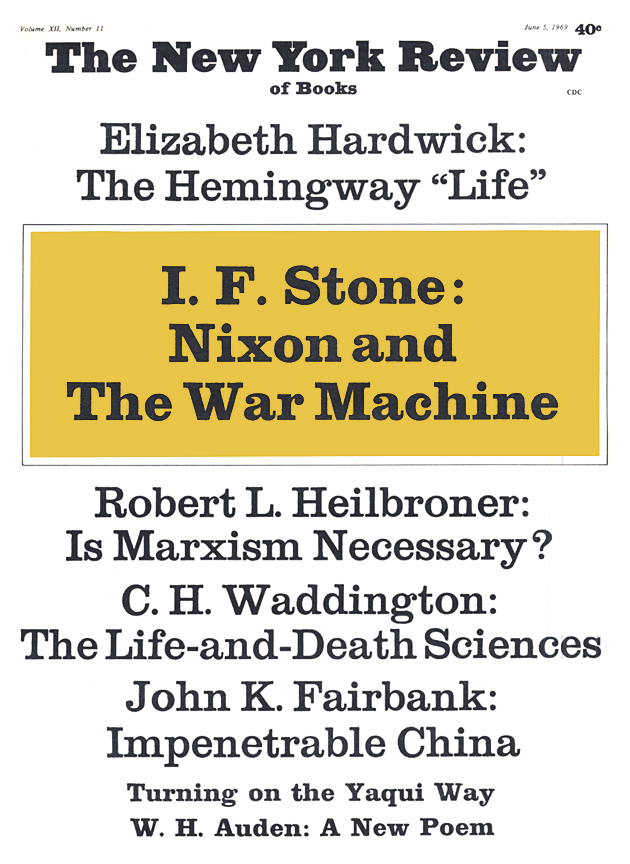In response to:
The Radical Students from the April 24, 1969 issue
To the Editors:
In a review [April 24] discussing the causes of student protest, and while citing examples of writers who fail to see the legitimate social complaints behind that protest, Mr. Frederick Crews quotes from a recent article of mine to the effect that “the very idea of commandment and regulation” has given way to “a psychology of unobstructed need.” Thereby he assimilates my views to those who improvise “theories condemning or belittling student radicals.”
The phrases Mr. Crews quotes actually occur in a discussion of “a line of Western thought, as also of sentiment in modern literature, which calls into question not one or another moral commandment or regulation, but the very idea of commandment or regulation.” This obviously is not a statement about the causes or a judgment as to the value of university regulations, student activities or faculty responses. “The psychology of unobstructed need” is placed in my article as part of a “new sensibility” in Western culture, and the one specific reference that follows is to Norman Mailer’s view that there is a heroic virtue, or at least a self-realizing value, in a hipster assaulting a fifty-year-old candystore keeper. As far as I know, Mailer is not currently a student.
I can only conclude that in concocting this amalgam, Mr. Crews is, at best, a disloyal polemicist. Furthermore, I have frequently written that there are legitimate social complaints behind student protest, while also making clear my opposition to the authoritarian politics of certain SDS elements and to those forms of campus protest (breaking up meetings, physical intimidation, systematic heckling in classes) which are intolerable to anyone who believes in democratic norms.
If it now be argued that “the line of Western thought, as also of sentiment in modern literature” that I was describing cannot be dissociated from current campus life, then I would say in reply: No doubt, most things can be connected, if one tries hard enough, but an honorable opponent would specify the kind of connection he claims to see and wishes to attack. One might believe the trends to which I pointed do have a certain relevance to campus life: but that would not at all be to say that they exclusively or even mainly determine the nature of student protest, nor would it be a way of either praising or “belittling student radicals.” Indeed, whether or not one accepts my view of cultural trends needn’t affect giving complete or partial support to particular student demands and actions.
Mr. Crews’s cheapness of argument shows him to be quite in accord with the most influential styles of discourse in current intellectual life. That’s his business; but the next time he wants to tangle with me, or anyone else, let him—as he no doubt tells his students—pay closer attention to the text.
Irving Howe
New York City
Frederick Crews replies:
Irving Howe has forgotten his own words. His “new sensibility” of drugs, of “orgasmic blackout,” and of everyone’s doing “his own thing” was obviously meant to characterize a generation, and he said so explicitly:
Perhaps because it is new, some of the new style has its charms—mainly along the margins of social life, in dress, music, and slang. In that it captures the yearnings of a younger generation, the new style has more than charm: a vibration of moral desire, a desire for goodness of heart. Still, we had better not deceive ourselves. Some of those shiny-cheeked darlings adorned with flowers and tokens of love can also be campus enragés screaming “Up Against the Wall, Motherfuckers, This Is a Stickup” (a slogan that does not strike one as a notable improvement over “Workers of the World, Unite”).
That this is not all Mr. Howe has to say about campus protest, everyone knows. He frequently gets down to cases in his “steady work” of checking up on the moral tone of “the ‘leftist’ prigs of the 60’s.” (“Cold war” is another phrase he now wraps in incredulous quotation marks.) His custom is to dwell at length on the dangerous authoritarianism of outsiders while granting that the established system could stand a little improvement. The only mystery is why he persists in calling himself a socialist; perhaps it is to give an impression of criticizing the Left from within.
Certainly Mr. Howe did not evoke the “new sensibility” merely to characterize “campus enragés“; rather, this was his way of linking most of the things that irk him in contemporary America, from “cultural sleaziness” to youthful ingratitude for “the achievements of anti-Stalinism.” If there is indeed a new “psychology of unobstructed need,” a socialist would relate it to such historical realities as automation, mass communications, and the artificial stimulation of consumer wants in a saturated economy. But Mr. Howe prefers to blame a disembodied intellectual trend. This enables him to identify certain rivals as bearers of error, with a strong implication that this error might yet be turned back by a heroic few who will not surrender “the norms of rationality and intelligence.”
What I said about Mr. Howe is that he uses vast generalities to belittle the ideas of radical students; that is manifestly true. His essay assimilates all issues to the immense cultural struggle between complexity and simplicity, good taste and bad. Like Henry James of The American Scene, whose alarm at everything nouveau has recently stirred Mr. Howe’s admiration, he has largely risen above concrete social ills and intends to give the world one last, undeserved lesson in high cultivation. No doubt, as he says in his letter, most things can be connected if one tries hard enough, but I don’t think a whole decade should be treated as a single fall from grace.
This Issue
June 5, 1969


